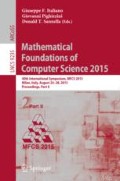Abstract
We investigate probabilistic space-bounded Turing machines that are allowed to make multiple passes over the random tape. As our main contribution, we establish a connection between derandomization of such probabilistic space-bounded classes to the derandomization of probabilistic time-bounded classes. Our main result is the following.
-
For some integer \(k>0\), if all the languages accepted by bounded-error randomized log-space machines that use \(O(\log n \log ^{(k+3)} n)\) random bits and make \(O(\log ^{(k)} n)\) passes over the random tape is in deterministic polynomial-time, then \(\mathrm{ BPTIME}(n) \subseteq \mathrm{ DTIME}(2^{o(n)})\). Here \(\log ^{(k)} n\) denotes \(\log \) function applied k times iteratively.
This result can be interpreted as follows: If we restrict the number of random bits to \(O(\log n)\) for the above randomized machines, then the corresponding set of languages is trivially known to be in P. Further, it can be shown that (proof is given in the main body of the paper) if we instead restrict the number of passes to only O(1) for the above randomized machines, then the set of languages accepted is in P. Thus our result implies that any non-trivial extension of these simulations will lead to a non-trivial and unknown derandomization of \(\mathrm{ BPTIME}(n)\). Motivated by this result, we further investigate the power of multi-pass, probabilistic space-bounded machines and establish additional results.
D. Mandal and A. Pavan—Research Supported in part by NSF grants 0916797, 1421163.
N.V. Vinodchandran—Research Supported in part by NSF grants 0916525, 1422668.
Access this chapter
Tax calculation will be finalised at checkout
Purchases are for personal use only
References
Adleman, L.M.: Two theorems on random polynomial time. In: Proceedings of the 19th IEEE Symposium on Foundations of Computer Science (FOCS), pp. 75–83 (1978)
Arora, S., Barak, B.: Computational Complexity: A Modern Approach. Cambridge University Press, Cambridge (2009)
Borodin, A., Cook, S., Pippenger, N.: Parallel computation for well-endowed rings and space-bounded probabilistic machines. Inf. Control 58(1–3), 113–136 (1983)
Chung, K.M., Reingold, O., Vadhan, S.: S-T connectivity on digraphs with a known stationary distribution. ACM Trans. Algorithms 7(3), 30 (2011)
David, M., Nguyen, P., Papakonstantinou, P.A., Sidiropoulos, A.: Computationally Limited Randomness. In: Proceedings of the Innovations in Theoretical Computer Science (ITCS) (2011)
David, M., Papakonstantinou, P.A., Sidiropoulos, A.: How strong is Nisan’s pseudo-random generator? Inf. Process. Lett. 111(16), 804–808 (2011)
Fortnow, L., Klivans, A.R.: Linear advice for randomized logarithmic space. In: Durand, B., Thomas, W. (eds.) STACS 2006. LNCS, vol. 3884, pp. 469–476. Springer, Heidelberg (2006)
Gill, J.: Computational complexity of probabilistic Turing machines. SIAM J. Comput. 6(4), 675–695 (1977)
Gutfreund, D., Viola, E.: Fooling parity tests with parity gates. In: Jansen, K., Khanna, S., Rolim, J.D.P., Ron, D. (eds.) RANDOM 2004 and APPROX 2004. LNCS, vol. 3122, pp. 381–392. Springer, Heidelberg (2004)
Hopcroft, J.H., Paul, W.J., Valiant, L.G.: On Time Versus Space. J. ACM 24(2), 332–337 (1977)
Impagliazzo, R., Nisan, N., Wigderson, A.: Pseudorandomness for network algorithms. In: Proceedings of the 26th ACM Symposium on Theory of Computing (STOC), pp. 356–364 (1994)
Karakostas, G., Lipton, R.J., Viglas, A.: On the complexity of intersecting finite state automata and NL versus NP. Theor. Comput. Sci. 302, 257–274 (2003)
Karpinski, M., Verbeek, R.: There is no polynomial deterministic space simulation of probabilistic space with a two-way random-tape generator. Inf. Control 67(1985), 158–162 (1985)
Lipton, R.J., Viglas, A.: Non-uniform depth of polynomial time and space simulations. In: Lingas, A., Nilsson, B.J. (eds.) FCT 2003. LNCS, vol. 2751, pp. 311–320. Springer, Heidelberg (2003)
Nisan, N.: Pseudorandom generators for space-bounded computation. Combinatorica 12(4), 449–461 (1992)
Nisan, N.: On read once vs. multiple access to randomness in logspace. Theor. Comput. Sci. 107(1), 135–144 (1993)
Raz, R., Reingold, O.: On recycling the randomness of states in space bounded computation. In: Proceedings of the 31st ACM Symposium on Theory of Computing (STOC), pp. 159–168 (1999)
Reingold, O.: Undirected connectivity in log-space. J. ACM 55(4), 1–24 (2008)
Reingold, O., Trevisan, L., Vadhan, S.: Pseudorandom walks on regular digraphs and the \({\rm RL}\) vs. \({\rm L}\) problem. In: Proceedings of the 38th ACM Symposium on Theory of Computing (STOC), p. 457 (2006)
Saks, M.: Randomization and derandomization in space-bounded computation. In: Proceedings of the 11th IEEE Conference on Computational Complexity (1996)
Saks, M., Zhou, S.: \({\rm BPSPACE}(S) \subseteq {\rm DSPACE}(S^{3/2})\). J. Comput. Syst. Sci. 403, 376–403 (1999)
Santhanam, R., van Melkebeek, D.: Holographic proofs and derandomization. SIAM J. Comput. 35(1), 59–90 (2005)
Author information
Authors and Affiliations
Corresponding author
Editor information
Editors and Affiliations
Rights and permissions
Copyright information
© 2015 Springer-Verlag Berlin Heidelberg
About this paper
Cite this paper
Mandal, D., Pavan, A., Vinodchandran, N.V. (2015). On Probabilistic Space-Bounded Machines with Multiple Access to Random Tape. In: Italiano, G., Pighizzini, G., Sannella, D. (eds) Mathematical Foundations of Computer Science 2015. MFCS 2015. Lecture Notes in Computer Science(), vol 9235. Springer, Berlin, Heidelberg. https://doi.org/10.1007/978-3-662-48054-0_38
Download citation
DOI: https://doi.org/10.1007/978-3-662-48054-0_38
Published:
Publisher Name: Springer, Berlin, Heidelberg
Print ISBN: 978-3-662-48053-3
Online ISBN: 978-3-662-48054-0
eBook Packages: Computer ScienceComputer Science (R0)

